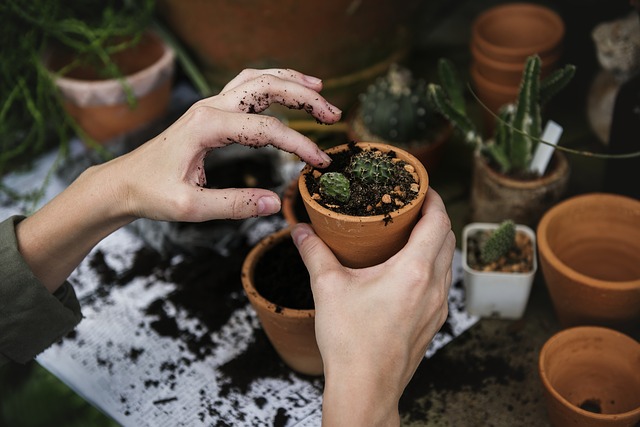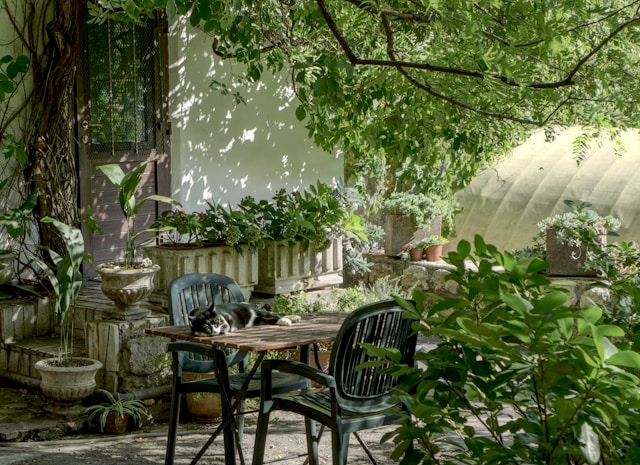Now that we are at the height of the growing season and everything in the garden is growing in full force, much of the harvesting has taken place as well. I have to admit its been a bit tough getting my hands in the dirt as usual with this seemingly endless drought and constant threat of wildfires.
Although it’s very hot and humid mid day here in Texas I can still enjoy the garden early in the evening. As I head out in an effort to get the water going I find myself still amazed at how well most things are doing in such extreme conditions. I still get overwhelmed at the Bermuda grass that keeps taking off over the top of a lot of the beds.
It comes up with a little hard work and I wonder if it isn’t actually helping the ground retain moisture in some areas. The chickens like it and I’ve learned to live with it as long as it doesn’t choke any plants out. I love sunsets, plain and simple. The evening sun always seems to awaken my spirit and bring it to rest. There have been studies to prove that the sun is the healthiest way to absorb vitamin D and can actually prevent many forms of disease.
All I know is there are times I feel like the sun is healing my bones. Did you know that there has been research showing that there is a bacteria found in healthy soil that acts as an antidepressant. Science says that it causes an activation of neurons in the brain that contained serotonin and causes you to feel happy. No wonder my grandson and I have so much fun playing in the dirt together. We hardly ever wear gloves except while weeding because the dirt feels so good in our hands as well as our spirits. I think the garden is a very healing and healthy place.
So what could be more natural than getting our hands in the dirt to make some of our own. To make dirt we need a whole bunch of organic matter. Organic matter will actually promote the life in your soil like the beneficial bacteria and microorganisms as well as provide all the natural nutrients that your plants need to grow. Most likely you can gather all your organic matter right at home. Instead of bagging up all those fallen leaves, grass clippings, weeds that have been pulled out, hedges that have been trimmed and sending it off with the trash, keep them.
All these things are like gold to make rich black dirt. It is a natural process called composting. For those who do not have access to a whole lot of organic matter can actually purchase compost. Just remember it is very important to know who your dirt daddy is.
There are a whole lot of products on the market today. Many of them say things like natural or actually say organic. But if there is not an official USDA Certified Organic Seal on that bag of soil it only means that it was derived from living matter. It is a marketing loophole called greenwashing designed to fool people. The companies that do this are avoiding the process it takes to be certified. With that being said I strongly recommend you make your purchases and get to know the folks at your local nursery. You will not only be supporting your local community but you can also ask questions in a more personal manor and avoid the big box stores.
With your organic matter gathered, you also need to start saving those kitchen scraps. You don’t want to save things like meat, but fish and fish bones and shells are perfect. You want to save those left over vegetable scraps, coffee and tea grounds and eggshells.
Hair and feathers add the bonus of phosphorous if you have access to them. Also manure will be needed. We have chickens so everything that gets cleaned out of the coop goes in the compost.Most manures work well while some have a stronger effect than others so you need to keep things well balanced. Horse, cow, rabbit and goat manures will do fine.
Next, depending on your neighborhood prepare an area to begin your composting. We are in a rural area and neighbors do not present a problem for us, but we do keep our compost piles towards the back of the garden behind the potting shed. One area was made into a bin using pallets and the other area is simply a pile off to the side.
We use one of the piles when it is ready and add to the other. If you need to be more discrete try digging a small hole near the back of your garden where no one can see and place your goodies in the hole and cover with a bit of dirt each time. No one will ever be the wiser.
My dirt daddy, who happens to be my other garden half, uses an old mower to shred the leaves and stocks and small limbs before adding them in the pile. The important thing is to keep a good balanced mix of brown manures and green manures. The browns are your leaves, hay and such which are your carbons. The greens are your grass clippings and kitchen scraps and such which will be your nitrogen.
No big science lesson, just try to keep the two types rather balanced. All that is left to do is turn it a bit once in awhile for oxygen to help break it down. You may need to water it once in awhile as well but you don’t want it to be soggy. If your getting rain don’t bother doing a thing. It helps when the weather is warm out so if your having cold weather you might want to cover it with a plastic tarp.
One last very handy thing to have is a really cool screen topped framed table like my handy garden husband crafted. The wheelbarrow fits neatly underneath the table and the screen top is removable. You could of course have a smaller version if the space is not available.
Perhaps just a small screen that fits on top of a large bucket. All I have to do is shovel a bit from the compost pile up on top of the table and with gloves on simply rub it around on the screen and all the rich fine dirt goes down into the wheelbarrow shifting out the big chunks or rocks. I can then lift off the screen and dump the large clumps into the other compost pile where they can finish breaking down. This procedure is especially good when I have a lot of seeds and cuttings to pot up. It is the perfect potting soil.
- Wild Dagga Motherwort Medicinal Herb - November 11, 2013
- Grow The Best Organic Lettuce - November 4, 2013
- Amish Hot Pepper Mustard - October 23, 2013


I learned the hard way about buying composted soil. Now my garden is not really “organic” because they bags of soil we purchased probably had chemicals in it.
About manure- I have learned that if an animal eats mostly plants, their manure is good for plants. If your animal’s diet is meat then you should shy away. Cows and horses? Good poo! Dogs and cats? Not so much!
Hi Aadel! I think a whole bunch of us have been fooled by some of the organic green washing. It can be very confusing and actually is meant to be that way. At least many types of chemicals will disperse and your can build from there. Excellent thought for sorting the poos!! =)